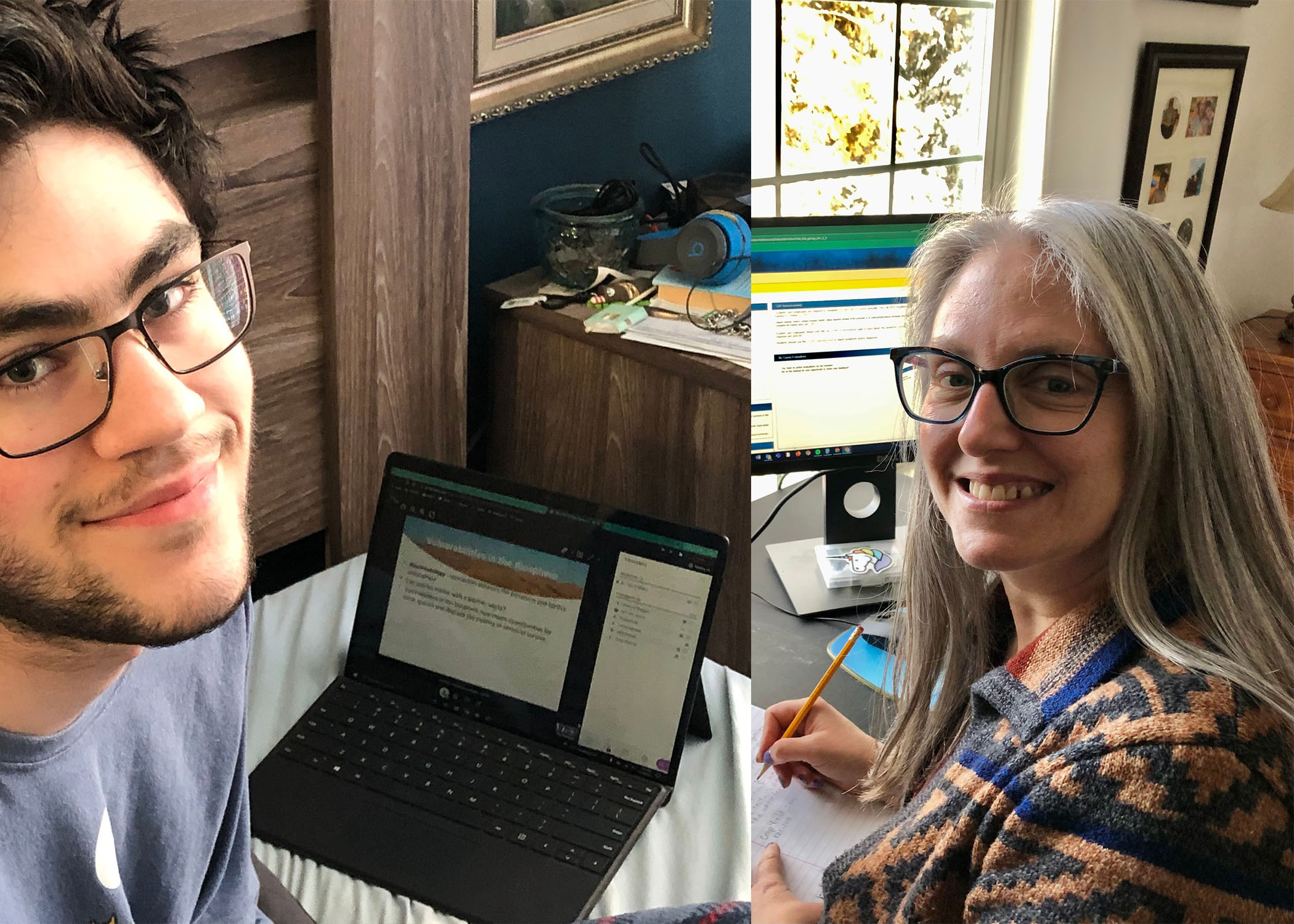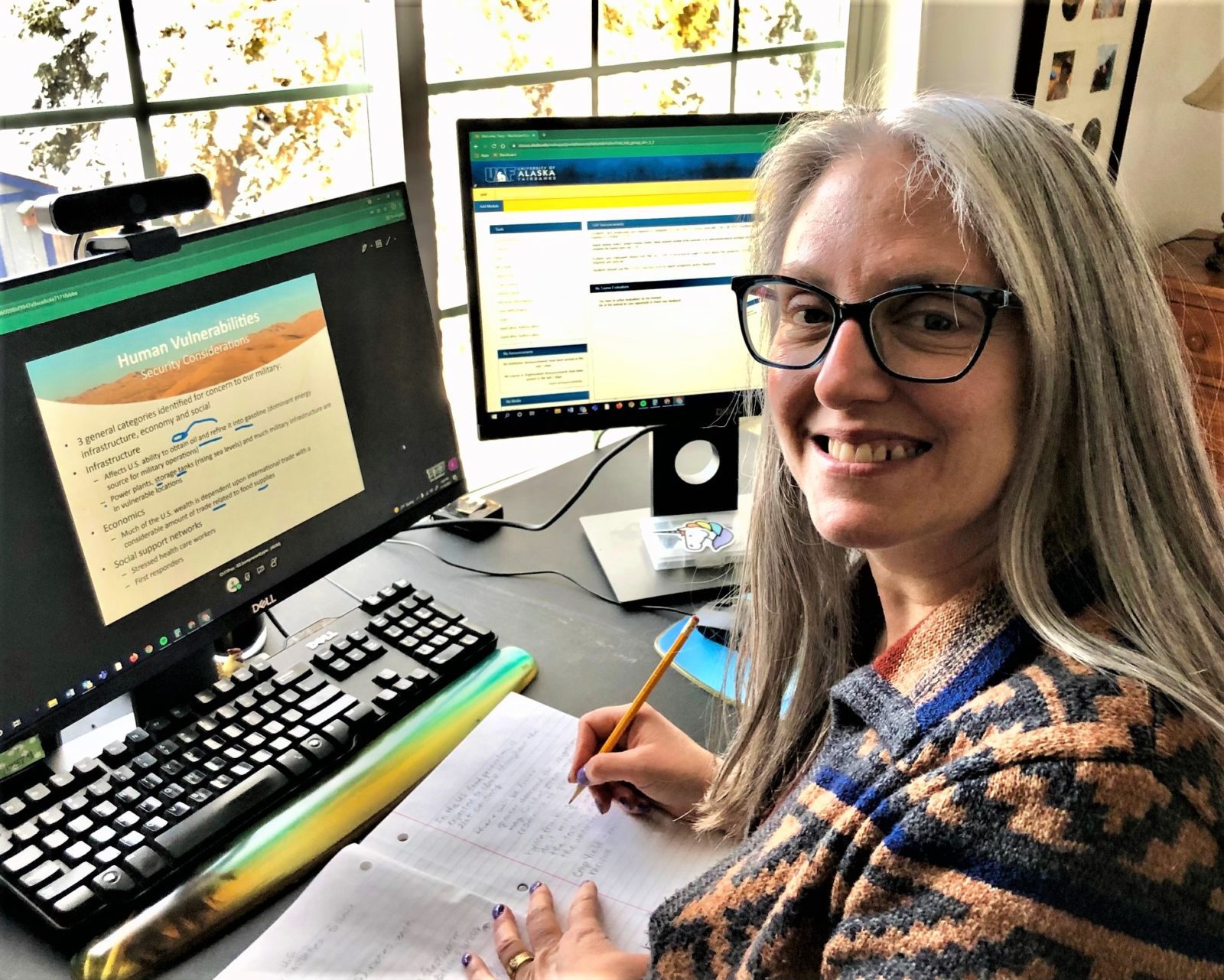
A mom’s lifetime learning: Taking a college climate class with her son
By Tracy Lohman, Trustees development director
I signed up for a college course called Climate Change in Alaska. I wanted to learn more about climate science and climate change—a crisis of great concern to me personally and professionally.

The class, offered through the University of Alaska Fairbanks’ Bristol Bay Campus in Dillingham felt a lot different than the courses I took 34 years ago.
For one thing, the class size was small with only seven students. It was virtual. And, unbeknownst to me before signing up, my 19-year-old son was also enrolled!
Sharpening my understanding
I asked Lucas if he’d prefer that I withdraw and he said, “No, it’s fine.” I thought, whoa, what a cool opportunity for creating common ground and a shared interest to discuss at the dinner table!
Excited, I sharpened my pencil and grabbed a notebook. Admittedly, I leaned on my son and the professor, Eric Goddard, to navigate the class’s online platform. Once I got the hang of it, though, I was ready to attend my first college class since the late 80’s.
As a nod to the good old ways, I put my penmanship skills to work taking “real” notes.
Familiar terms given deeper meaning
Throughout the session, I heard many familiar terms, like ocean acidification, greenhouse gas, Arctic amplification, El Niño and La Niña, and I gained a better grasp of their meaning and impacts on our lives.
I learned new terms and concepts, too, like the albedo effect, a measure of how much the sun’s energy is reflected back from the surface of the earth into space and the atmosphere.
Most of all, I learned that climate change is complicated and its impacts on people and the planet complex, real, and often devastating.
Beyond the stats
The data and evidence shows the speed at which climate change has and is raising Alaska’s temperatures, and in turn causing the melting of glaciers, eroding of coastlines, and climate pressures on people’s food, water and homes, often forcing communities to relocate.
Look, I grew up just outside of the Rust Belt City of Pittsburgh, where it was a common sight to see smoke billowing from the stacks of steel mills. Even as a small child, the black air felt wrong. Perhaps Woody the Owl’s message of “Give a Hoot, Don’t Pollute” really resonated with me.

Yet, I was also made to believe that those industrial belches meant the city was prosperous and people had good jobs; I also know my family lived paycheck to paycheck and with an ongoing sense of fear and instability because of the threat of losing jobs.
What mixed and confusing messages.
I’m older now and know that the long-term health of all living things requires that we look beyond extractive worldviews and toward ways of living sustainably.
Alaska is at a tipping point. The Arctic is not only experiencing the effects of climate change faster than other parts of the world, but it also offers significant evidence of what the future holds for the planet.
Scientists predict that Arctic summers could be ice-free as early as 2050, and that would have far reaching consequences for all living systems.
We have a lot to worry about, and even more to do.
It’s the planet, stupid
The class I took with my son gave me a deeper understanding of just how complex and dynamic climate change and its impacts really are. And also a greater understanding of our obligation as humans and animals to future generations.
We hear all the time how Alaska contains many precious things, from land, water and animals to the people who make up its expansive and diverse communities. For me, this means taking care of these things, not exploiting them.
Beyond disillusionment
My son and I talked about class over dinner. We talked about specific lectures, assignments and due dates. We compared notes.
In our conversations, he expressed his concerns about the future. I heard in his voice and words his sense of urgency and worry, tremendous frustration, and a bit of doom.
He and I both feel disillusioned by the lack of leadership in our country, the dangerous latching on to fossil fuels and exploitation as the only way to live, and the truth that our nation is one of the biggest greenhouse gas polluters.
The effects of climate change are devasting, and sometimes life threatening – burning our homes and forests, polluting our water, and contaminating our food. We are experiencing unpredictable weather that brings on extreme floods and droughts, and salmon are turning up dead or dying.

Beyond the tipping point, the effects can be irreversible. It’s a global crisis that needs immediate and dramatic action.
Action starts with an ‘A’
What my child and I took away from our shared learning experience is a pledge to do more and demand more from others. We refuse to settle for lethargy and apathy. In order to reverse – or at least stop global warming caused by human industrialization and consumption and the burning of fossil fuels, we want to see alternative, clean-energy solutions and more government, institutional and system-wide action.
This will not be an easy task. It will require a change in thinking, in how institutions work, in the systems that define how our societies operate.
It may seem easier to do nothing, or wonder what’s the point. Making the future a good place, a healthy place, for those who come after us requires something of us, for sure. It requires that we get involved, that we speak up, that we demand that those who want our votes, support or business adopt climate practices and policies that effectively, immediately and absolutely transition away from fossil fuels, exploitive practices, and overconsumption.
Our future depends on us making these demands. I knew the importance of climate action before taking this class, and now I know something else, too – that clumping people into groups like “this generation or that” is a false division.
We’ve always been in this together.
Oh, what’s the word on mom’s bragging rights? We both aced the class.
Important side note: I am grateful to Prof. Eric Goddard for sharing his expertise and for offering this amazing course. I enjoyed every minute of the lectures and I learned so much! I am also grateful to Lucas for sharing his perspective and feelings about climate change. Thank you!


